How Have Women's Political Rights Fared in Egypt?
Zainab Al-Suwaij, American Islamic Congress
Yassmine ElSayed Hani, Al Akhbar Daily Newspaper, Cairo
Nancy Okail, Freedom House
Kate Seelye (moderator), Middle East Institute
Photos | Transcript | Video
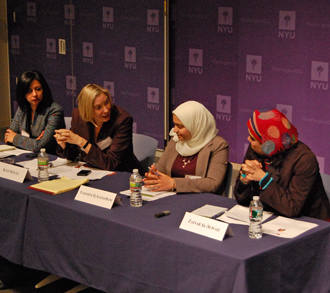 Washington, DC—On November 16, 2012, WFPG hosted a panel discussion on how women’s political rights have fared in Egypt with Zainab Al-Suwaij of the American Islamic Congress, Yassmine ElSayed Hani of Al Akhbar daily newspaper and Nancy Okail of Freedom House. Their remarks included a discussion on controversial portions of the new draft constitution, developmental and economic issues, and issues surrounding the unification and mobilization of women’s rights activists. The event was moderated by the Vice President of the Middle East Institute, Kate Seelye, and co-hosted by and held at NYU Washington, DC.
Washington, DC—On November 16, 2012, WFPG hosted a panel discussion on how women’s political rights have fared in Egypt with Zainab Al-Suwaij of the American Islamic Congress, Yassmine ElSayed Hani of Al Akhbar daily newspaper and Nancy Okail of Freedom House. Their remarks included a discussion on controversial portions of the new draft constitution, developmental and economic issues, and issues surrounding the unification and mobilization of women’s rights activists. The event was moderated by the Vice President of the Middle East Institute, Kate Seelye, and co-hosted by and held at NYU Washington, DC.
The panelists commented on article two of the draft constitution, which states that laws will be determined by the principles of Shari’ah Law and article 36, which states that men and women are equal unless there is shown to be a contradiction in an action with Shari’ah Law. Okail added that there is an article being proposed that would give government power to oversee the upbringing of youth. Hani believes that Egyptians do not have a problem with the “principles of Shari’ah”, that is, the actual text of the Qur’an. What Egyptians take issue with are the “rulings of Shari’ah”, which leaves room for much interpretation of Shari’ah Law and can be dangerous for women’s rights.
Okail began by discussing the conditions for women under the Mubarak regime. The regime confined women through culture, laws, and practices. She explained that Egyptian women become aware of their own roles in society through the process of socialization throughout childhood. During the revolution, women were harassed and women’s rights were marginalized. She shared her own experience of being arrested, put into a cage with 20 other female activists because of her participation in the Tahrir Square protests. In a post-Mubarak Egypt, Okail believes that Egyptian society still faces many challenges with regards to women’s rights including a lack of awareness of the issues and where they come from: unfair laws in the constitution or an institutional platform.
Hani saw women in Egypt as facing three main problems. One concerned economic difficulties, as more than 50% of Egyptians live below the poverty line and many have minimal or no education or access to clean water. She also sees many development issues in Egypt such as the inability for women to find jobs, high illiteracy rates, and poor access to healthcare. These development issues affect all Egyptian women. Women living under these conditions generally prioritize others over themselves in order to take care of their families. The third aspect of women’s rights that Hani sees as evident, especially after the uprisings, is the political component. All Egyptian women fought together during the revolution but because the public sphere was opened to everyone during the uprisings, extremists used their new platform to attack women. Hani explained that in a post-Mubarak Egypt, women are choosing to participate in political parties, continuing to engage in activism and are following political events in the news.
Al-Suwaij thinks that the biggest problem facing women in the Arab Spring countries is a lack of mobilization and organization among women activists. Quotas can and have encouraged political participation of women in the Middle East. Al-Suwaij sees a large problem facing women through the implementation and interpretation of Shari’ah Law. All of the panelists agreed that the youth were a huge force in the revolution. In Hani’s words, “This community, this youth community has its own language, its own principles, its own free public sphere to communicate, to challenge—they have the will to challenge and they have the power to challenge. They transcend institutions.”
During the discussion, a lively debate ensued between Al-Suwaij and Hani on whether women could be judges under Islamic law. Al-Suwaij explained that even if you argued that the text of the Qur’an allowed women to be judges, the fact is that women are not and were not commanding a strong presence in the Egyptian judiciary. Hani emphasized that Egyptians must not accept the “norms” of society and would be favorable to a country governed by the principles of Shari’ah Law. Okail then summed up the debate with, “what you are seeing right now—this interaction between Zainab and Yassmine—is actually the problem we are having in Egypt, who has the authority to define what Islam is? Who has the authority to interpret the verses of Islam? Who defines who that authority is?…it’s going to be the leaders in the country who define who has the word and the right to define what Islam is and what the rules are.”
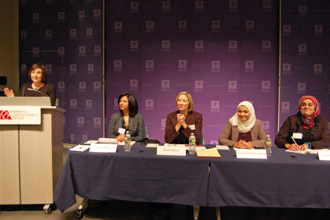 |
 |
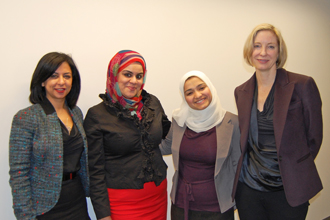 |
WFPG President Patricia Ellis introduces the program
|
|
Panelists Nancy Okail, Zainab Al-Suwaij, Yassmine
ElSayed Hani, and moderator Kate Seelye
|
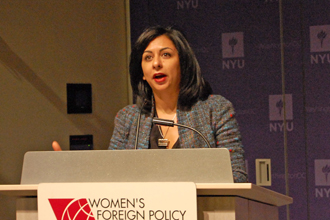 |
 |
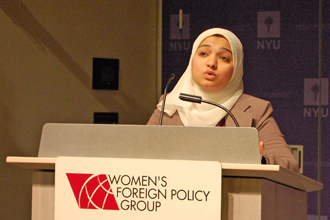 |
Nancy Okail of Freedom House
|
|
Yassmine ElSayed Hani of Al Akhbar
Daily Newspaper, Cairo
|
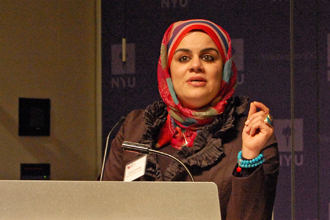 |
 |
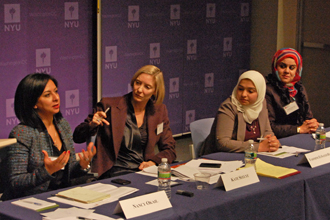 |
Zainab Al-Suwaij of the American Islamic Congress
|
|
Panelists speak to WFPG
|
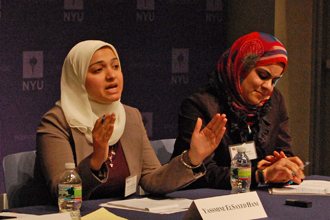 |
 |
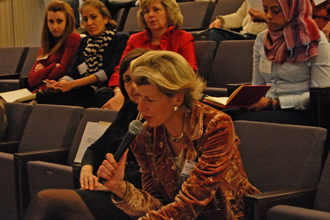 |
Yassmine ElSayed Hani answers questions during Q&A
|
|
WFPG Board Member Diana Villiers
Negroponteasks a question
|
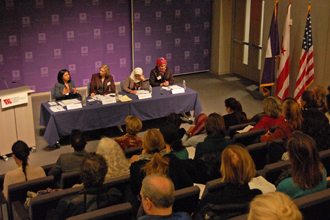 |
 |
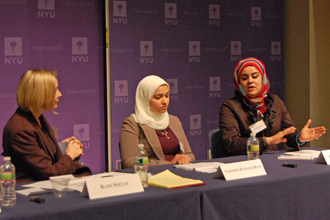 |
| |
|
|
| |
|
|